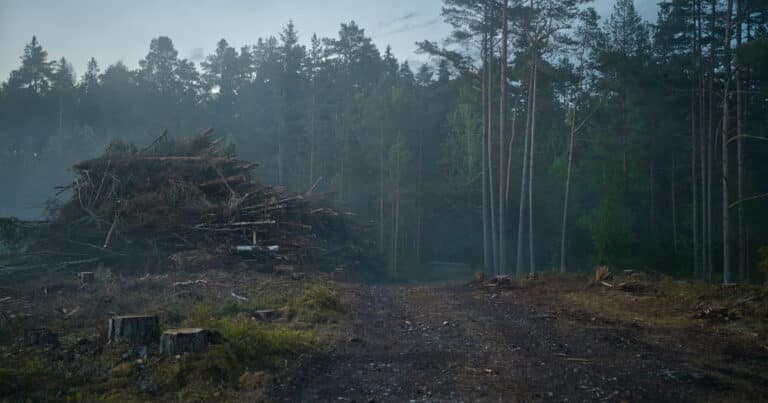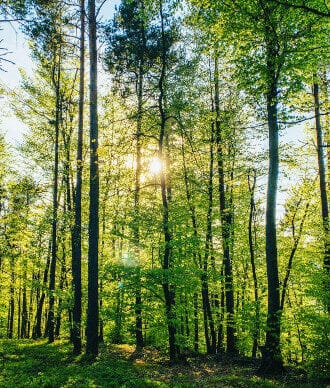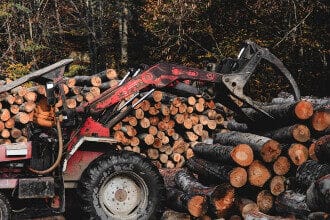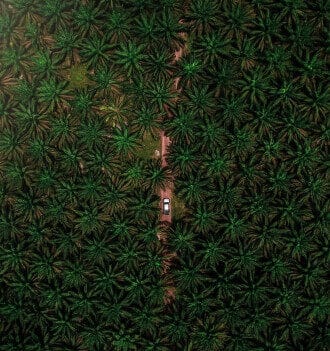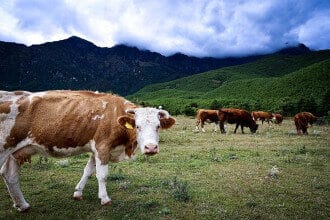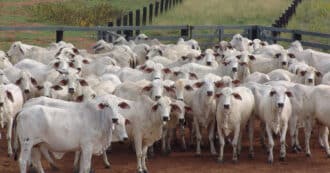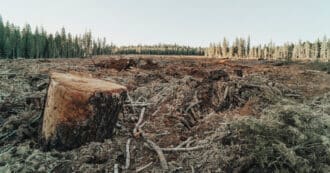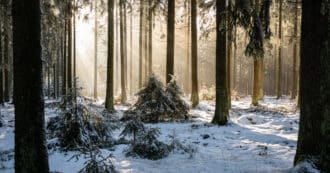By Harry Cooper – Any environmentalist would be a strong proponent of stopping both deforestation and climate change. But what many people don’t realize is that the two issues are more related than meets the eye. Trees are incredibly important for sustaining ecosystems and protecting biodiversity. However, they are also an important factor in the carbon cycle and the fight against climate change.
Trees and Global Warming
When trees grow they take in carbon dioxide and release oxygen. Each tree takes in around 48 pounds of carbon a year out of the atmosphere, and harmlessly stores it away. When these trees disappear due to deforestation they become incapable of storing carbon. On top of that, all the stored carbon in the tree’s trunk and root system gets released into the atmosphere when they get cut down.
Not only does deforestation directly contribute to climate change by releasing carbon dioxide into the atmosphere, but in many parts of the world, forests are cleared for unsustainable land uses, such as industrial agriculture. These practices often involve releasing greenhouse gases and other environmentally harmful practices.
Carbon Sequestration
During photosynthesis, trees capture carbon dioxide from the air, bind it with sugar, and release oxygen. This process makes trees an incredible way to naturally store carbon that would otherwise contribute towards warming the planet.
Long Term Carbon Storage
There are several different factors that determine how well a tree can sequester carbon. One of the most important is its age.
Saplings and young trees grow rapidly and therefore take in carbon faster than older trees. However these are more likely to die off, and are not as capable of storing carbon long term.
Middle aged trees take in carbon at a slower rate than young trees. However, since they are often hardier trees, forests with more middle aged trees tend to take in more overall carbon than younger forests.
Old growth forests are usually spread out and take up carbon fairly slowly. While they are not as efficient as young and middle aged trees, because old growth trees live so long, they can store large quantities of carbon in their massive trunks, branches, and root systems for hundreds of years.
Other Factors that Impact Carbon Sequestration
There are many other factors that impact carbon sequestration, such as soil. Forests with a lot of debris and leaf litter in their soil are often much better at binding carbon atoms into the soil.
Another important factor is temperature. While warmer tropical forests grow faster and take in more carbon, colder temperatures allow for carbon to stay in soil and plant matter easier. So while warm forests may take in more carbon, colder forests have more overall stored carbon dioxide.
Deforestation and Stored Carbon
Forests have historically been one of the planets best ways to keep extra carbon from getting into the atmosphere. However, as deforestation rates have risen in the past century, so has the atmosphere’s total carbon.
Carbon Sink to Carbon Source
When a tree dies and starts to decompose, all the carbon stored inside it gets released into the atmosphere. As more and more trees get cut down through deforestation and forest degradation, the more important it becomes for us to protect forests.
It is estimated that the carbon released during deforestation contributes around 10-15% of greenhouse gas emissions to global climate change. As a result, the forests of the world are no longer a net carbon sink, but rather an overall source of carbon entering into the atmosphere.
Clearing Forests for Unsustainable Land Use
The act of cutting down forests directly contributes to climate change by getting rid of Earth’s natural way of keeping carbon out of the atmosphere. On top of that, former forest cover is often replaced with unsustainable land usage.
Tropical Deforestation and Commodity Production
One of the biggest drivers of deforestation, specifically tropical deforestation, is not lumber, but rather to make room for commodity production and industrial agriculture. These practices often release more greenhouse gases on top of the ones released during deforestation.
Palm Oil in Southeast Asia
Southeast Asia is home to some incredibly biodiverse and healthy rainforests. However these have begun to disappear due to the increasing demand for palm oil. Palm oil plantations consist of massive monoculture fields that provide little biodiversity and have little capacity to sequester and store carbon.
Beef Production in the Amazon Rainforest
The Amazon rainforest is one of the largest continuous rainforests in the world, but it is constantly being cleared away to make room for cattle ranching and beef production. This gets rid of forests, and also creates environmentally harmful industrial farms.
Cattle ranching not only creates drier environments, but the practice of slash and burn agriculture to clear land for farming leads to an increase in forest fires. These forest fires cause more deforestation and release massive amounts of carbon into the atmosphere.
Sustainable Forest Management
While the future may seem bleak for the Earth’s forests and climate, there is still hope that we can recover. Sustainable forestry initiatives have shown that sustainable forestry practices can not only help rebuild forests, but do so in a way that helps them sequester and store more carbon. These sustainable forestry practices are apart of a group of policies known as Reducing Emissions from Deforestation and Degradation, or REDD+ for short.
REDD+ policies were designed by environmental policy makers to guide governments in reestablishing forests for the sake of sequestering carbon. These kinds of policies have been used in the outlining of the Paris Agreement and have helped countries everywhere work towards reducing deforestation.
Religion and Deforestation
Deuteronomy 29:17 and 29:21–24 – Perhaps there is among you some man or woman or some clan or tribe, whose heart is even now turning away from the Lord our God to go and worship the gods of those nations – perchance there is among you a root sprouting poison weed and wormwood . . . And later generations will ask – the children who succeed you, and foreigners who come from distant lands and see the plagues and diseases that God has inflicted upon that land, all its soil devastated by sulfur and salt, beyond sowing and producing, no grass growing in it just like the upheaval of Sodom and Gomorrah, Admah and Zeboiim, which the Lord overthrew in His fierce anger – all nations will ask, “Why did the Lord do thus to this land? Why that awful wrath?”
Who Is Held Accountable? Eco Bible Volume 2
Rabbi Shlomo ben Yitzchak (Rashi) asks how God can justify punishing the whole community for the sins of the few. God says: “I will not punish you (the community) for the concealed acts.” As Deuteronomy 29:28 states, “The concealed acts concern God,” and God will exact punishment directly upon the individual who sins covertly.
In this verse, Moses states that “the overt acts apply to us and to our children.” We are responsible for detecting the sins committed openly in our community and to eradicate any evil among us. And if we do not execute judgement upon transgressions of which we are fully aware, then the whole community will be punished because we have avoided our responsibility.
In our times, why must we hold specific people or corporations accountable to protect society as a whole? In Brazil, more than 700,000 hectares of rainforest are cleared per year, mainly for beef cattle ranching. In 2017, Brazilian company JBS, the largest beef producer in the world, was substantially fined for its contribution to deforestation. This one company was responsible for the annual deforestation of an area three times the size of Manhattan (as well as corruption, bribery, financial and accounting violations, and insider trading). Yet, the fines are insufficient to stop a multibillion-dollar industry.
In 2021, a new effort emerged to make such “ecocide” by major polluters an offense punishable by the International Criminal Court in The Hague. The word “ecocide” refers to all forms of environmental destruction. As Time magazine reported, “In December 2020, lawyers from around the world gathered to begin drafting a legal definition of ecocide. If they succeed, it would potentially situate environmental destruction in the same legal category as war crimes, genocide, and crimes against humanity.”
* Featured image source

